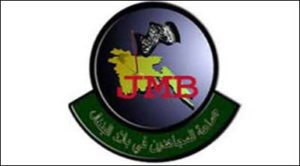
By BenarNews
By Paritosh Kanti Paul
Bangladeshi militants were behind a bomb-blast last month at a Buddhist pilgrimage site in northeastern Bihar state while Tibet’s spiritual leader, the Dalai Lama, was visiting the area, in a plot to avenge violence against Rohingya Muslims in Myanmar, Indian police said Friday.
Two suspected members of Neo-JMB, a faction of Jamaat-ul-Mujahideen Bangladesh (JMB), were arrested by the West Bengal police’s Special Task Force on Thursday and confessed to their involvement in the low-intensity explosion in Bodh Gaya on Jan. 19, task force chief Muralidhar Sharma said. No casualties were reported.
The blast occurred near the Kalachakra grounds just minutes after the Tibetan spiritual guru completed a workshop there. Police said they could not confirm whether the bombs were intended to target the Dalai Lama, 82.
“We had recently detained some people from West Bengal and Assam whose interrogation led to the arrests of these two men. They have confessed they belong to Neo-JMB and that they were involved in the Bodh Gaya attack. They said the attack was meant to retaliate against atrocities committed against Rohingya Muslims in Myanmar,” Sharma told BenarNews.
The police recovered “50 kilograms [110.2 pounds] of ammonium nitrate, some other chemicals, electronic devices, gloves and some objectionable literature,” he added.
Neo-JMB is the group that authorities in Bangladesh blamed for a terrorist siege that killed 29 people, including 20 hostages and five gunmen, at an upscale café in Dhaka in July 2016. The extremist group Islamic State claimed responsibility for the attack.
Bangladesh shelters about 1 million Rohingya refugees, including 688,000 who fled from Myanmar’s Rakhine state since late August 2017, amid a brutal crackdown by the military and police. It followed attacks on security outposts carried out by Arakan Rohingya Salvation Army insurgents.
Nearly 4,400 Rohingya were killed in atrocities allegedly committed by the Myanmar security forces and Buddhist militias, according to a partial list compiled by Rohingya refugee leaders in southeastern Bangladesh and obtained by BenarNews.
On Thursday, Yangee Lee, the U.N.’s special rapporteur on human rights in Myanmar, told reporters the violence against the Rohingya minority bore “the hallmarks of a genocide.”
More bombs found
The two suspects arrested this week in West Bengal were identified as Indian nationals Mohammad Paigambar Sheikh, 24, and Jamirul Sheikh, 31, both residents of the state, police said.
Sharma said the two accused men had “planted eight bombs” near the Kalachakra grounds where foreign Buddhist pilgrims were camping to celebrate the month-long Kalachakra festival, but only one went off.
A day after the explosion, officials with the National Investigation Agency (NIA), India’s top counter-terror unit, recovered and defused two unexploded bombs from the site. The NIA, which is investigating the Bodh Gaya attack, will interrogate the suspects, an official told BenarNews on condition of anonymity.
Paigambar, who was trained in 2012 by Bangladeshi handlers, was in touch with JMB chief Salauddin Salehin, Sharma said.
He said raids were continuing across West Bengal to arrest more suspected members of the Bangladeshi terror outfit who were believed to have crossed into India following the attack at the Holey Artisan Bakery café in Dhaka on July 1, 2016.
“Neo-JMB is the party that nurtures Islamic State’s ideology and is responsible for recent atrocities,” Monirul Islam, the chief of Bangladesh’s counter-terrorism and transnational unit, told BenarNews last year.
Since the 2016 siege, Bangladeshi forces have killed dozens of suspected militants in anti-terror raids, Islam said, adding that some Neo-JMB leaders had fled to India.
Bangladeshi militant groups were taking advantage of cultural and linguistic similarities in Indian states including West Bengal, according to Nirmal Dutta, a former Indian intelligence official.
“Ever since the Bangladeshi government began cracking down on terror following the Dhaka attack, Bangladeshi terrorists have taken refuge in West Bengal, where they are actively recruiting Indians to carry out clandestine operations,” Dutta told BenarNews.
